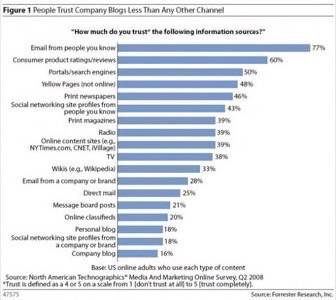This week’s RWW Live, our regular podcast show, was on the topic of ‘shopping 2.0’. In Part 2 of our analysis of the show, we explore how e-commerce has evolved over the past few years – what web technologies our expert guests are currently using and the trends they’ve picked up on.

We had 4 expert guests on the podcast: Baynote (collective intelligence platform for online shopping), ModCloth (online retailer of vintage clothing), Retrevo (vertical search for electronics), and Cartfly (social commerce store network).
Part 1 of this series was about how shopping 2.0 sites are targeting niche customers and how that’s helped them increase revenues.
Implicit Social Recommendations
RWW Live host Sean Ammirati asked the guests whether e-commerce has changed much over the past few years. Kurt Collins, VP of Business Development of Cartfly, replied that there is now a lot of implicit social recommendations across social networks and blogs. Jack Jia, founder and CEO of Baynote, noted that “99% of the crowds” are silent and so the implicit recommendation data that Kurt referred to is very valuable. It’s crucial, said Jack, to tap into the interests, likes and dislikes of that invisible crowd. He added that that it may not be ‘friend’ data either, as we currently tend to think of it in social networks.
Eric Koger, CEO of niche clothing retailer ModCloth, said that they pay close attention to what their customers do across social sites – e.g. in their case their users activities in Flickr, StyleHive and social networks.
Expert-Driven or Crowdsourcing?
Where there was some disagreement among the guests was on the value of crowdsourced recommendations and reviews. Jack Jia, founder and CEO of Baynote, said that traditional e-commerce and commerce in general has been expert-driven, but now the crowds are driving decision-making in retail. Andrew Eisner, Director of Community and Content, Retrevo, took issue with this – saying that user reviews are key, pointing to the expert reviews at Retrevo. It’s worth noting here that Andrew also used to work in the content arena, at PC World.
We’d be interested in our reader’s opinion on this issue. Clearly consumer reviews in aggregate represent very valuable data for big online retailers especially – e.g. Amazon has virtually built its entire business off the back of crowdsourced user reviews and recommendations. What’s more, this type of data is highly trusted by consumers – one of the factoids perhaps lost in the commotion about Forrester’s report on trust in corporate blogs, is that consumer product ratings and reviews are the second most trusted data online, behind only email from someone you know:

Yet we can also see Andrew’s point of view, that there is a big place for expert reviews when it comes to consumer products online. For example, I’m more likely to read and take notice of a review of Bose headphones by a CNET reviewer who specializes in music electronics, than a review written by “lolcatzndogz67”. What do you think? Perhaps in aggregate, crowdsourced data is key; but when it comes to decision-making on certain types of products, we still want to read expert reviews before we buy.
How Can Existing E-commerce Vendors Tap Into the Social Web More?
A RWW commenter called Mark commented on the original RWW Live post that he has just relaunched a social/e-commerce website. He used to have an eBay site, but now he wants to tap into the social web more. Here is what Mark wrote:
“In our previous site launch, we spent months building a database of products, opened the doors of the site, and it was just too much product, and not enough interaction with our customer base.
In our relaunch, we decided to go social first, e-commerce second. Working on our customer relationships first. The site is a transition from our successful eBay business to a more controllable blog/e-commerce solution.”
I put that dilemma to our guests, starting with Kurt Collins – whose service Cartfly addresses exactly that need. Kurt said that the socialization of e-commerce can come in different forms – e.g. embedding a store in a user’s social network profile. That won’t replace “end destination e-commerce”, but Kurt said it will “augment sales tremendously” at the edge of the network. It’s all about bringing the product to the customers, rather than the other way round.
Eric from ModCloth said that their business started by using a series of open source shopping systems. He says that they still currently use an “archaic” e-commerce platform, but that blogging and direct engagement on external networks are their current tools for reaching out to ModCloth customers.
Favorite Online Shipping Web Apps
Finally, a bit of a tradition we’ve started on RWW Live is to ask our guests at the end of the show to name one web app in their field of expertise (other than their own) which has caught their eye. So I put this question to our 4 guests: which online shopping app do they recommend to the listeners and readers of ReadWriteWeb?
Andrew said “vertical gadget sites”, but he also said that Amazon “does everything right in the world of shopping” – particularly because it recommends products he didn’t know he wanted.
Eric mentioned Revolve Clothing, and what they’re doing with the “category view” – allows you to see a lot more at a higher level.
Jack mentioned that he buys books from Amazon and other specialist sites, but he still goes to Google for products that he needs to do search on.
Kurt said that ThinkGeek (‘stuff for smart masses’) is one of his favorite sites and that Zappos is a site that many of his women friends use. He also mentioned that he buys a lot of things from iTunes.
One of my favorite sites of the moment is a new social wishlist called Boxedup.com, which I mentioned in our roundup of 10 wish list websites. However, I have to admit that I’ve since renewed my interest in Amazon Wish Lists – their universal wish list feature pretty much does all I need.
Sean also said that Amazon is his favorite, due to related recommendations. But he had a shout-out for Glue, the browser add-on made by AdaptiveBlue.
Tell us your current favorite online shopping app or site in the comments!
You can listen to the entire RWW Live podcast on shopping 2.0 here:
Download MP3
Image credit: Fosforix










